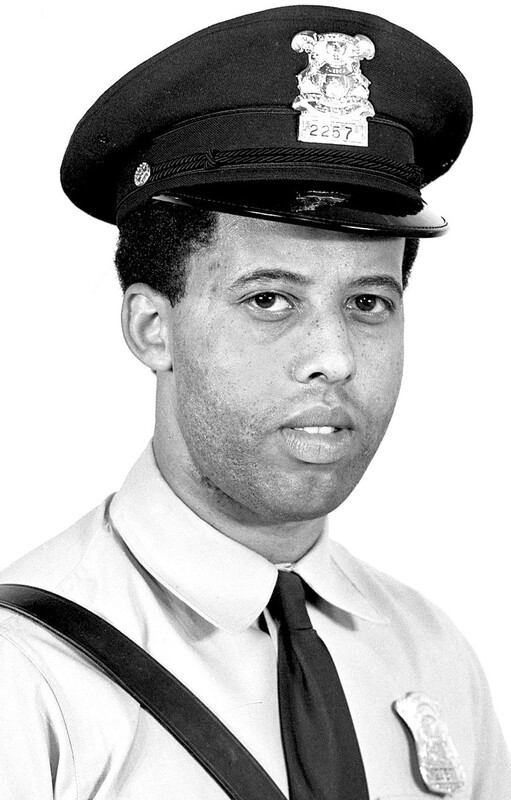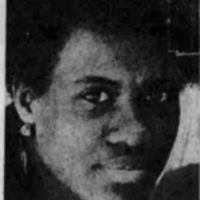IN FOCUS: Donald Kimbrough
Donald Olson Kimbrough was a U.S. Air Force veteran who began his career with the Detroit Police Department in 1970. He was married and the father of one child. Kimbrough became a police officer in order to "do something significant for the community" by enforcing the the law fairly. In his second year on the job, Kimbrough took a stand against police brutality by white officers, as a number of black policemen did during the late 1960s and early 1970s, and gave evidence against them in the ensuing investigation. It is likely that his willingness to confront police brutality and misconduct shaped the DPD's response to a tragic incident in 1972, when Donald Kimbrough was shot by two white men during a murky narcotics-related encounter and subsequently paralyzed. He received no compensation or recognition by the DPD after becoming the victim of gunfire by criminals, in stark contrast to the typical and overwhelming law enforcement response when white officers were shot and/or killed in the line of duty. Other black officers, led by the Concerned Police Officers for Equal Justice, charged the DPD with racial discrimination in the treatment of wounded officers and protested on Kimbrough's behalf. Officer Kimbrough, who was 26 years old when shot, eventually returned to the DPD on limited desk duty but had to take a medical retirement for permanent disabiity in 1977. He never recovered from his injuries and died on December 7, 2017, at the age of 71.
Speaking Out Against Police Brutality and Misconduct
In February 1971, LaSandra Randolph, a 25-year-old African American woman, was stopped by a car holding four DPD officers as she drove down Cass Avenue near the campus of Wayne State University, where she was a student. Three of the officers were white, and the only black officer, Donald Kimbrough, was riding in the back seat. Two of the white officers, Anthony Velat and Michael Zilkowski, stated that Randolph had been speeding, searched her car, confiscated her license, and then arrested her for "fleeing and eluding" law enforcement. According to LaSandra Randolph's account, made in a formal complaint to the DPD, the two white officers stopped her for no legitimate reason, repeatedly called her racial epithets, and then kicked and injured her after placing her in their car while under arrest. Among other misconduct, Randolph stated that the officers called her an "uppity n-----" and a "black bitch," threatened to "fix your ass," roughed her up during the arrest, and then kicked her in the legs, requiring hospital treatment after her release from jail.
After the incident, Patrolman Donald Kimbrough told LaSandra Randolph the real reason that the white officers detained and beat her: because she had a "Free Angela Davis" bumper sticker on her car, in support of the prominent black power radical who was incarcerated in California at the time. Kimbrough also publicly contradicted the DPD coverup, led by Police Commissioner John Nichols, who asserted that there was no evidence of misconduct by any of the officers. Nichols cited the ongoing investigation of the Citizen Complaint Bureau and said that all four officers had given sworn statements refuting LaSandra Randolph's allegations. In comments to the media, Kimbrough denied that he had done so, promised to testify in support of Randolph at her upcoming trial, and said that the court proceedings would expose "one hell of a story."
The LaSandra Randolph case received extensive media attention because of Kimbrough's willingness to defy the "Blue Curtain" prohibition against police officers testifying against other officers, and because of her position as a Wayne State University student with prominent allies. Randolph's husband was a track coach at the university and also worked as an aide to a member of the Detroit City Council, which requested a formal report on the incident from Commissioner Nichols. State senator Coleman Young also took up Randolph's cause and demanded a thorough inquiry. Instead the prosecutor charged Randolph with resisting arrest and trying to escape from the officers who pulled her over. At her trial, Patrolman Anthony Velat preposterously testified that he had kicked LaSandra Randolph in order to help her get into the police car without being injured: "I used my feet to shove her feet inside the car so her legs wouldn't be squashed when I slammed the door shut." Officer Donald Kimbrough attended the court proceeding, prepared to testify as to what really happened, but the prosecution did not call him (unlike the other officers present) and the defense did not have to because the judge dismissed the charges based on the obvious lack of evidence. Not suprisingly, the DPD's internal investigation cleared the white officers of brutality and misconduct, despite the fact that Patrolman Donald Kimbrough, in an act of courage and defiance, supported the allegations made by LaSandra Randolph.
All in all, the LaSandra Randolph case revealed the DPD's continued criminalization and brutality against black power activists for their political beliefs, and the increasing willingness of black officers such as Donald Kimbrough to take a stand against white officers who broke the law and mistreated black citizens. In doing so, Kimbrough left himself susceptible to mistreatment by the DPD and may well have suffered the consequences in the next stage of his story, which ended in tragedy and allegations of racial discrimination.
"The Man the World Forgot"
On August 25, 1972, Officer Donald Kimbrough was on patrol in plainclothes when he and his partner received a call of a robbery in progress and reported gunfire. Kimbrough was working the vice beat in the Woodward Avenue area of the 13th Precinct, one of the most dangerous assignments in the city. The officers encountered two armed white men outside of a methadone clinic for heroin addicts. As they approached and identified themselves as police officers, one of the suspects opened fire and shot Donald Kimbrough in the shoulder and the spine. His partner, Donald Hughes, returned fire, but both men escaped. The suspects, allegedly from Saginaw, were never apprehended. The DPD did not launch a manhunt, which raises suspicions (see below) and is a quite unusual ending for a case involving a civilian shooting of a police officer--or at least would have been unusual had the shooting been of a white officer instead.
Donald Kimbrough was paralyzed from the waist down by the shooting. He was left permanently disabled and personally devastated, but his tragic circumstances also received almost no public attention until a white DPD officer, Robert Dooley, was shot and paralyzed in a STRESS-related shootout four months later, in December 1972. The Detroit Police Department escalated a massive manhunt for the African American suspects after the wounding of Officer Dooley, which stood in stark contrast to the limited efforts to find the white man who shot Donald Kimbrough in a case that otherwise had the same outcome. An association of DPD officers donated $5,000 to Robert Dooley, the Detroit City Council authorized another $10,000, and many DPD officials attended a benefit in his honor that raised an additional $40,000. By contrast, Donald Kimbrough had received no compensation for his injuries and, as he recounted in a Detroit News feature, not even a card or visit from Commissioner John Nichols after he was shot and paralyzed. The media stories that eventually refocused attention on Donald Kimbrough's plight only came about because the Concerned Police Officers for Equal Justice, a recently formed political association for black Detroit officers, began denouncing the DPD for its racist "double standards" in the treatment of the two men and threatened to picket the benefit for Officer Dooley if Donald Kimbrough was not also included (despite this pressure, he was not). According to the association, the DPD was clearly guilty of treating a black officer disabled by white assailants differently from a white officer disabled by black assailants:
Donald Kimbrough told the Detroit News that he felt like "the man the world forgot." He expressed appreciation for the support of the Concerned Police Officers for Equal Justice but said he did not want financial assistance "at Dooley's expense," because they had each suffered equally. Kimbrough then charged that the racial discrimination evident in their unequal treatment by the DPD "has really shattered my morale and taken its toll on other black policemen. . . . My biggest concern is that if they aren’t going to act on me, they probably wouldn’t on others of my race." Still, Kimbrough wished he could be a policeman back on the streets again, "because I loved the work and believe in the law." After the wave of negative publicity, a civic coalition that included the Chrysler Corporation, United Auto Workers, and Detroit Free Press started a benefit fund for Donald Kimbrough that began soliciting the donations that the DPOA union and other DPD-linked associations generally organized for white officers wounded or killed in the line of duty. In the months that followed, Kimbrough finally received some compensation for his disability and even participated as the honorary leader of a "Stand Up Black Man" protest march organized by civil rights activists that ended at the headquarters of his former police precinct.
Lingering Questions
Donald Kimbrough's commitment to calling out racist abuse and criminal conduct by white officers in the LaSandra Randolph case, followed by the lack of concern and compensation he received from the Detroit Police Department following a paralyzing injury in the line of duty, lead us to ask questions that do not have clear answers.
- Did the DPD retaliate against Kimbrough for breaching the "Blue Curtain"?
- Did Kimbrough stand up against white officers in other cases as well, including ones involving less prominent black citizens that did not receive media coverage, perhaps inviting more retaliation?
- Given the extensive DPD corruption in the illegal narcotics market, and the pattern documented throughout this exhibit of violent reprisals against African Americans who pursued charges of police brutality and testified against police officers, is it possible that the mysterious and motive-less shooting of Kimbrough itself could have been tied to vengeful DPD officers?
- Why did the Detroit Police Department make so little effort to find the armed criminals who were responsible for the cold-blooded shooting of an on-duty black police officer, when manhunts for wounded or killed white officers generally stopped at nothing? Could this also be tied to potential police involvement in the shooting of Kimbrough by a mysterious out-of-town gunman?
- Was the DPD's neglect of this disabled black officer simply a case of racial discrimination, or was it a broader message of intimidation aimed at other black officers who were joining political groups such as the Guardians of Michigan and Concerned Police Officers for Equal Justice, speaking out against DPD racism and police brutality, and might be considering bucking the "Blue Curtain" as well?
These questions are speculative, and ultimately impossible to resolve, but they are necessary to ask in the context of the systemic racism within the DPD during this era, the never solved 1970 murder of the head of the Michigan Civil Rights Commission during an anti-police brutality investigation, and other suspicious killings of black police officers assigned to narcotics patrols and vice districts notorious for police corruption, including the unsolved murder of Patrolman Ulysses Brown in 1971 and the STRESS-linked Rochester Street Massacre in 1972.
Sources:
Detroit Commission on Community Relations/Human Rights Department Records, Walter P. Reuther Library, Archives of Labor and Urban Affairs, Wayne State University
Luise Leismer, "Crippled Officer-'Man World Forgot,'" Detroit News, March 3, 1973
Detroit Free Press, March 7, 12, 1971, Aug. 26-28, 1972, March 10, 17, 1973
Michigan Chronicle, Aug. 4, 1973
Donald Olson Kimbrough, Officer Down Memorial Page, https://www.odmp.org/officer/23477-police-officer-donald-olson-kimbrough



